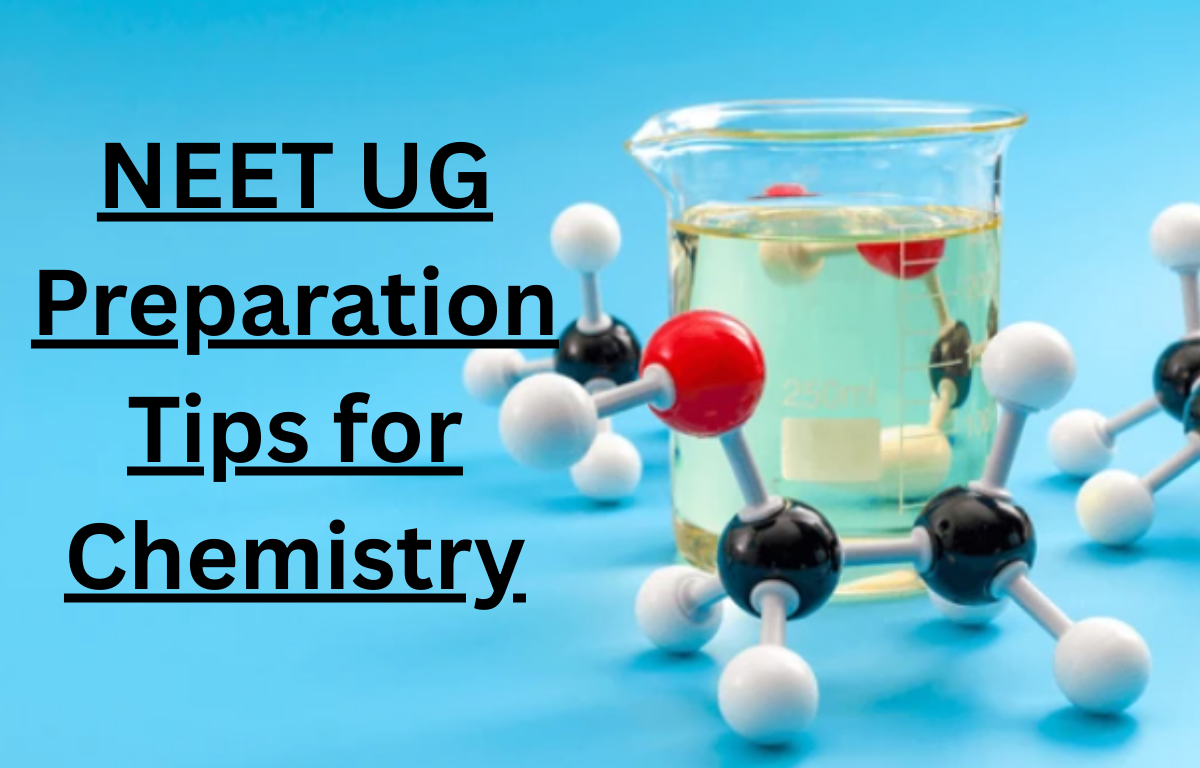Table of Contents
With the NEET UG Exam Date just around the corner, it’s the perfect time to boost your Chemistry preparation! This article brings you the simplest and smartest tips to master Chemistry without stress. Whether it’s tricky Organic, logical Inorganic, or scoring Physical Chemistry, we break it down into easy steps. Focus on NCERT, practice smartly, use NEET Sample Papers, revise quickly, and manage your time like a pro. From chapter-wise strategies to last-minute hacks, everything you need is here. Designed for every NEET aspirant, this guide helps you turn Chemistry into your top-scoring subject. Let’s make the final days count and push your Chemistry score to the next level!
NEET UG Chemistry 2025
Chemistry is an important subject in the NEET UG exam, which is scheduled to be held on May 4, 2025 [Sunday]. It carries 50 questions, out of which students need to attempt 45. The Chemistry subject is divided into Physical, Organic, and Inorganic Chemistry. To score well, students should focus on the NCERT textbooks, especially for Classes 11 and 12. Important topics like chemical bonding, equilibrium, hydrocarbons, and coordination compounds should be reviewed well. Regular practice of MCQs and mock tests helps in improving speed and accuracy. Solving NEET previous years’ question Paper PDFs also gives a better idea of the NEET exam pattern.
NEET Chemistry Class 10, 12 Important Topics
The NEET Chemistry Syllabus 2025 covers all the important topics from Class 11 and 12. In Class 11, focus on Basic Concepts, Atomic Structure, Chemical Bonding, Equilibrium, Thermodynamics, and Hydrocarbons. In Class 12, important topics are Solutions, Electrochemistry, Chemical Kinetics, Coordination Compounds, p-block elements, and Organic Chemistry. Learn formulas, reactions, and concepts well. Practice NCERT questions along with some Best NEET Chemistry Books and previous year papers. Below, we have discussed all the important Chemistry topics for the upcoming NTA NEET Exam 2025.
- Organic Chemistry: Some Basic Principles and Techniques
- Alcohols, Phenols, and Ethers
- Redox Reactions
- Structure of an Atom
- Thermodynamics
- Electrochemistry
- Hydrocarbons
- The p-Block Elements (XII)
- The p-Block Elements
- Chemical Bonding and Molecular Structure
- Classification of Elements and Periodicity in Properties
- Equilibrium
- Chemical Kinetics
- Biomolecules
- Haloalkanes and Haloarenes
- Solutions
- Some Basic Concepts of Chemistry
- Coordination Compounds
- Aldehydes, Ketones, and Carboxylic Acids
- Amines
- The d and f-Block Elements
How to Study Chemistry for NEET 2025?
The NEET Chemistry syllabus has been divided into three major portions, namely the physical chemistry, organic chemistry, and inorganic chemistry. Each section represents its own importance and challenges, therefore, students need to follow different approaches for each section in order to complete their preparations for the exam. Below, we have explained the techniques and preparation strategy for the NEET Chemistry Exam 2025.
How to Study Physical Chemistry for NEET 2025?
The section of Physical Chemistry in the NEET 2025 Exam will comprise 15-20 questions, most of which will be numerical-based. Most of the questions in this section will be asked from topics like chemical and ionic equilibrium, redox, liquid solutions, and electrochemistry. However, preparing for the exam requires students to study each and every chapter, hence, they must follow the tricks listed below:
- Revise all the important chapters and topics from the NCERT Books
- Try to note down all the important formulas on paper sheets
- On understanding the concept of a topic try to read the chapter from other referance books also
- Try to apply formulas by solving as many questions as possible
- Try to solve physical chemistry NEET Previous Year Question Papers
NEET Chemistry Important Questions with Solutions
Question 1: 21.75 g of MnO2 on reaction with HCl forms 2.8L of Cl2 (g) at STP; the percentage purity of MnO2 is:
(Given: Atomic mass of Mn = 55 u)
MnO2 + 4HCl → MnCl2 + Cl2 + 2H2O
a) 80%
b) 75%
c) 33%
d) 50%
Answer: d) 50%
Solution: MnO2 + 4HCl → MnCl2 + Cl2 + 2H2O
Moles of MnO2 = Moles of Cl2
Given, Cl2 = 2.8L
∴ Moles of Cl2 = 2.8/22.4 moles
We know that 1 mole of MnO2 yields 1 mole of Cl2
∴ Moles of MnO2 that yield 2.8/22.4 moles of Cl2 = 2.8/22.4
∴ Amount of MnO2 = (2.8/22.4) x 87g (Molar mass of MnO2 = 87g)
∴ Percentage of MnO2 = (2.8/22.4) x (87/21.75) x 100 = 50%
Question 2: van der Waals constants (a) for the gases A, B, C and D are 1.25, 3.29, 4.28 and 0.244, respectively. The gas which is most easily liquefied is:
a) A
b) B
c) C
d) D
Answer: c) C
Solution: Van der Waals forces are weak electric forces attracting neutral molecules in gases, liquefied and solidified gases, and almost all organic liquids and solids. The tendency of such persistent dipoles to align with one another generates a net attractive force.
Because the intermolecular force is related to the van der Waals constant ′a′, the gas with the largest value of ′ a ′ is the easiest to liquefy. As a result, the value of constant ‘a’ in C is the highest.
Question 3: The radii of the 2nd Bohr orbit of Be3+ ion is:
a) 26.45 pm
b) 52.9 pm
c) 79.35 pm
d) 105.8 pm
Answer: b) 52.9 pm
Solution: rn = a° x (n2/Z) = 52.9 pm x (22/4) = 52.9 pm
Question 4: Four monobasic acids, A, B, C and D, have their respective ∆neutH° values of –11.5, –7.5, –12.4 and –8.9 kcal/mol. Which of the following acids has the highest pKa value?
a) A
b) B
c) C
d) D
Answer: b) B
Solution: ∆neutH° ∝ Acidic strength
We know that, pKa = –log Ka
B has the lowest magnitude, which means it has the highest pKa value. Thus, B is the correct option.
Question 9: The species which does not exist is:
a) Li2
b) C2
c) H2
d) He2
Answer: d) He2
Solution: The Bond Order of He2 is zero. Hence, it does not exist.
How to Prepare for NEET Chemistry 2025?
Here’s a fun and focused study schedule for NEET preparation strategy for Chemistry that balances learning, revision, and relaxation. You can follow this daily schedule and tweak it based on your own pace:
Morning Boost (7:00 AM – 9:00 AM)
- 7:00 – 7:15 AM: Quick warm-up – revise formulas or flashcards
- 7:15 – 8:00 AM: Study Physical Chemistry (Concept + Problem-solving)
- 8:00 – 9:00 AM: Practice 15–20 MCQs from the same topic
Mini Break (9:00 – 9:30 AM)
- Stretch, walk, or listen to music
Midday Session (11:00 AM – 1:00 PM)
- 11:00 – 12:00 PM: Study Organic Chemistry (Mechanisms + Reactions)
- 12:00 – 1:00 PM: Solve reaction-based MCQs or take a mini quiz
Afternoon Chill (1:00 PM – 3:00 PM)
- Lunch + Power nap (15–30 mins) or watch a science-based video for fun learning
Evening Session (4:00 PM – 6:00 PM)
- 4:00 – 5:00 PM: Study Inorganic Chemistry (NCERT line-by-line + Mind maps)
- 5:00 – 6:00 PM: Solve PYQs or concept-based questions
Night Revision (8:00 PM – 9:30 PM)
- 8:00 – 8:30 PM: Flashcard revision / short notes
- 8:30 – 9:30 PM: Full chapter test (alternate days) or mock practice
Tips to Keep It Fun
- Use colorful sticky notes and highlighters
- Turn reactions into storylines or mnemonics
- Join a daily quiz with friends
- Reward yourself after finishing goals (music, snacks, memes)








 NEET Rank Predictor 2025 - Calculate You...
NEET Rank Predictor 2025 - Calculate You...
 AIIMS Delhi Cut Off 2025 Out, Check NEET...
AIIMS Delhi Cut Off 2025 Out, Check NEET...
 NEET Admit Card 2025 in May 2025- Check ...
NEET Admit Card 2025 in May 2025- Check ...


